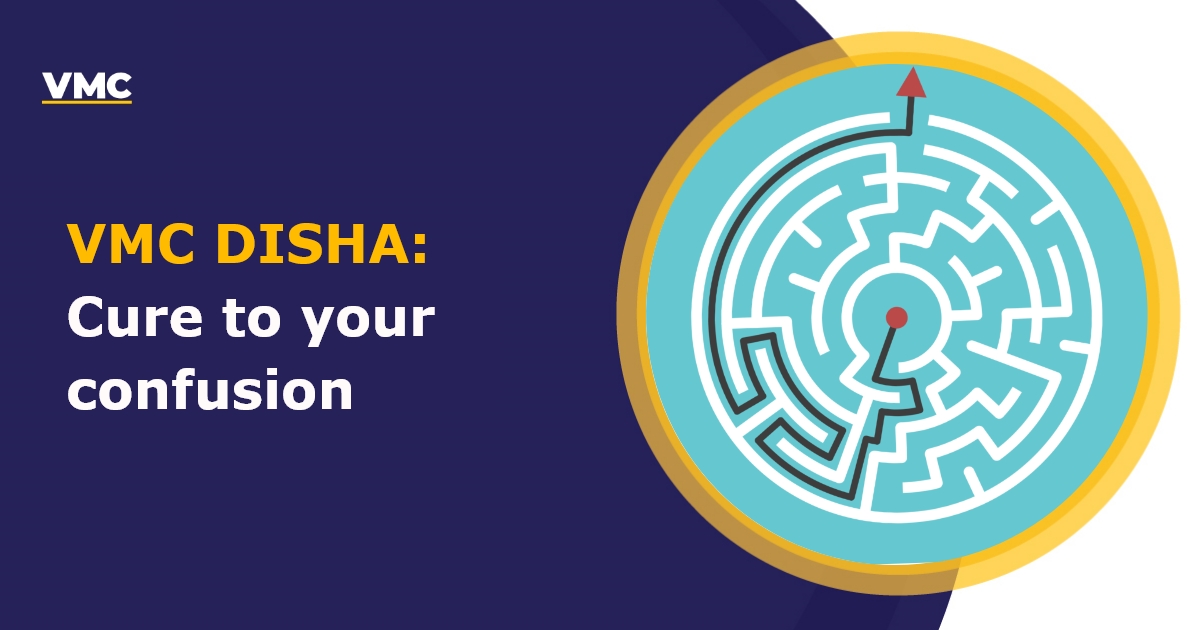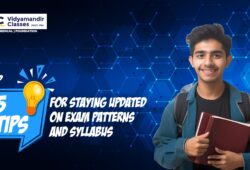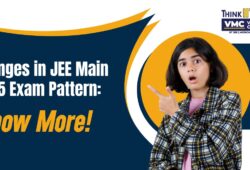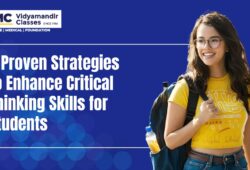VMC Disha: Cure to your confusion
 Posted On
Posted On
849 total views, 1 views today
“No matter how long you have travelled in the wrong direction, you can always turn around.”
– Anonymous
VMC Disha is an important initiative taken by the marketing team of VMC in pursuant to strengthen the school outreach programs. Keeping in line with its goal of providing knowledge and guidance while helping students in the most important decisions of their lives, the best-in-class stream selector test, VMC Disha is aligned for students of class 8th, 9th, & 10th in order to make the process of stream selection easy and effortless for them.
The aim of VMC Disha is to promote potential and abilities that is imperative in building the bright future that you deserve. Often in a myriad of opportunities, you might find difficult to take the road that is just meant for you. Feelings of confusion, anxiety, doubts may peak in when you are unable to take that one step that could lead you to your dream life. Having decades of experience in education sector with a keen interest in students’ wants and desires, VMC understand what’s it like to stand in the middle of the river and therefore, after a lot of research, we’ve come up with VMC Disha- a quick, holistic test that puts an end to your confusion regarding which stream to choose after class 10th whilst also providing a platform to help you achieve your dreams.
The test is separated into various parameters which are further divided into sub-parameters for a better and an in-depth information about all that can be known. The parameters on which students can uncover their skills and potentials are:
- Orientation Style: Orientation style identifies what an individual is driven by. Understanding the orientation style will help you with career decision based on your dominant style of interaction with the surroundings.
- Creative: Creativity is marked by the ability to use the imagination or original ideas to create something.
- People: People orientation implies that you’d rather not keep your head down and work in isolation. You prefer engaging directly with people in your day-to-day life.
- Administrative: It involves helping to organise and supervise the way that an organization or an institution works.
- Informative: It is an ability to provide or convey information.
- Personality: Understanding your Personality will help you identify your consistent behavior patterns. Every individual is different due to their unique blend of attributes. Personality assessment identifies what career options suit your style and match your personal attributes.
- Organizational Skills: Organization skill is the ability and style of an individual to structure plan and meet their goals in a systematic manner.
- Decision Making Capacity: Decision making capacity is the tendency to choose effectively from alternatives through reasoning and critical thinking.
- Enthusiasm: Synonymous with vitality, spiritedness & vigor, enthusiasm is having abundant or intense energy and curiosity to gather knowledge
- Extraversion: Extraversion is the ability to talk easily to others, assert viewpoints and prefer working in groups, rather than working alone.
- Practical: Synonymous with pragmatic, real & hands-on; practical is being more concerned with practice than theory.
- Locus of Control: Locus of Control is the individual’s perception of the power they have over events that happen in their lives. People with this trait believe that they have control over their own destiny and are convinced about their own skills.
- Agreeableness: Agreeableness is the ability to sympathize with others, trust them and be warm, concerned and cooperative towards them.
- Team Work: Team work implies including not only your views but also the views of others while working towards a common goal. It involves working collaboratively with people and maximizing the team output.
- Interest: Understanding your interest will help you identify what work areas excite you and helps you identify career options which are personally rewarding. Interest assessment explores your interest across multiple career options to find the right match which shall keep you engaged.
- Home Science: The course involves a thorough study of nutrition, health, family, food, hygiene and others which help in maintaining the standard living standards as these parameters are an essential part of a being.
- Multimedia & Web Technology: Multimedia is media and content that uses a combination of different content forms such as text, audio, still images, animation, video, and interactivity content forms. Second, web technology is the development of the mechanism that allows two or more computer devices to communicate over a network.
- Accounts: Accounting is a science that is used to analyze and manipulate financial data for businesses and the public.
- Entrepreneurship: Ability and eagerness to develop, organize and run a business enterprise, along with any of its uncertainties in order to make a profit.
- Political Science: Focuses on the theory and practice of government and politics at the local, state, national, and international levels.
- Chemistry: A scientific discipline that involves the study of matter, its compositions, properties and reactivity with other elements.
- Computer Science: Encompasses the study of various topics such as languages, programming, algorithms, program designing, and software designing.
- Sociology: A social science concerned with the study of society and human behavior and relationships.
- Fine Arts: The areas of study include painting, sculpture, architecture, music, poetry, and performing arts like theatre and dance.
- Designing: Encompasses the study of both the internal practices of design and the external effects that design activity has on society, culture and the environment.
- General Science: A course of study incorporating elements of several different sciences, typically as a school subject.
- Economics: Economics is a social science concerned with the production, distribution, and consumption of goods and services. It studies how individuals, businesses, governments, and nations make choices about how to allocate resources.
- Psychology: Psychology is the study of the mind and human behavior. The subject is about how those around us think, what kind of feelings they experience, how they act and interact, and what motivates them.
- History: The study of life in society in the past, in all its aspect, in relation to present developments and future hopes.
- Engineering: Orbits around science and technology concerned with the design, building, and use of engines, machines, and structures.
- Geography: Study of the diverse environments, places, and spaces of Earth’s surface and their interactions.
- Language: Study of conventional spoken, manual (signed), or written symbols by means of which human beings express themselves.
- Biology: Study of living things and their vital processes that deals with all the physicochemical aspects of life.
- Aptitude: Understanding your Aptitude will help you explore your innate strengths. Every individual has a unique area of expertise and their own forte. Aptitude assessment predicts what is your innate ability and potential and helps you find career options that are in sync with your aptitude.
- Numerical: Ability to quickly grasp mathematical functions and to use them to analyze and solve mathematical problems.
- Language Usage: Ability to understand and use words along with the grammatical rules and structures to produce meaningful-novel sentences.
- Abstract: Ability to work with new concepts, abstract ideas & recognizing patterns and similarities.
- Mechanical: Ability to grasp and use mechanical concepts and principles to so solve problems.
The test accompanies with it a 30-page detailed stream/career report with scoring on each of the 4 parameters additional sub parameters. Additionally, the test also provides an Individual Improvement Plan (IIP) which is unique and special for each individual student.



